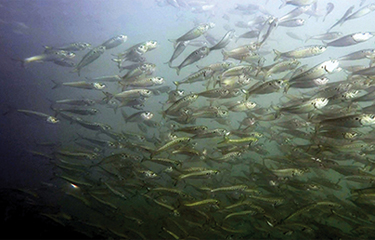Climate change effects in the ocean are already shifting fish populations, and a new study by Rutgers University scientists predicts changes in the food web could prevent those species from thriving in their new geographic ranges.
The study, published 13 April in the journal Proceedings of the Royal Society B, points out how climate-driven changes to food web relationships could change over time. Using computer modeling for hundreds of fish populations over 200 years of warming, the researchers showed that species-by-species predictions of fish movements are likely overestimating their ability to adapt to changing conditions.
“What that suggests from a fisheries perspective is that while the species we fish today will be there tomorrow, they will not be there in the same abundance. In such a context, overfishing becomes easier because the population growth rates are low,” study co-author Malin Pinsky, an associate professor in Rutgers’ Department of Ecology, Evolution, and Natural Resources said in a statement. “Warming, coupled with food-web dynamics, will be like putting marine biodiversity in a blender.”
The researchers’ “spatially explicit food-web model” included factors such as metabolism, body size, and optimal temperature ranges. Accounting for climate change, the model demonstrated that dynamic changes in predator-prey interactions will hamper fish species’ ability to react quickly to warming temperatures.
“We found that dynamic trophic interactions hampered species range shifts across 450 simulated food-webs with up to 200 species each over 200 years of warming,” the authors wrote in an abstract. “All species experiencing dynamic trophic interactions shifted more slowly than single-species models would predict. In addition, the trailing edges of larger-bodied species ranges shifted especially slowly because of ecological subsidies from small-shifting prey. Current forecasts ignoring dynamic food-web interactions and allometry may overestimate species' tendency to track climate change.”
The effect of climate change will be most pronounced for large predator species, and that could raise the chances for overfishing to occur, the paper found. Top predator species may also linger longer in their historic ranges, even as their usual prey shift away, when historical habitats, new food species arrive.
“The model suggests that over the next 200 years of warming, species are going to continually reshuffle and be in the process of shifting their ranges,” said lead author E.W. Tekwa, a former Rutgers postdoctoral researcher in ecology, evolution, and natural resources, now at the University of British Columbia. “Even after 200 years, marine species will still be lagging behind temperature shifts, and this is particularly true for those at the top of the food web.”
Pinsky said the such seismic global shifts being caused by climate chage are sure to be negatively disruptive to most seafood species.
“These dynamics will not only be in one place but globally,” Pinsky said. “That does not bode well for marine life, and this is not an effect that has been widely recognized.”
Photo courtesy of NOAA/Jerry Prezioso







